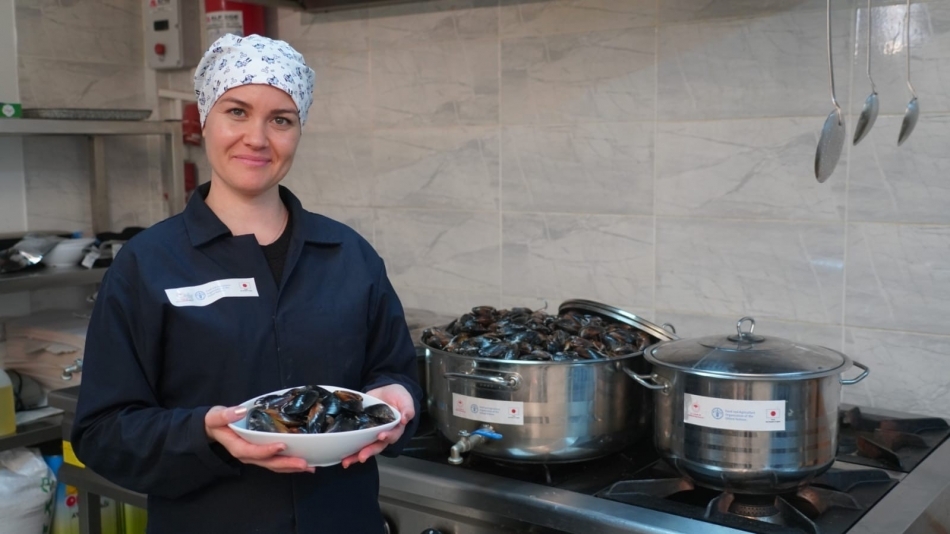15/06/2021 With Turkey hosting more than 3.6 million Syrians, that makes it home to the world’s largest refugee population. Many of those refugees, who have been granted “temporary protection” in Turkey, work in the agri-food and livestock sectors, which offer the most opportunities in the areas where they reside. However, these opportunities are often informal and seasonal, exposing Syrians and vulnerable Turkish communities, especially women, to poor working conditions, informal employment, and low or irregular wages. This situation triggers social tension, and this has proved particularly the case during the COVID-19 pandemic.
An assessment carried out by the Food and Agriculture Organization of the United Nations (FAO) and its local partners in 2017 showed that cooperatives run by and for women offer opportunities to take charge of their own economic activities, especially in situations where they face social and cultural constraints. Last year, FAO, with the support of the Government of Japan, started a project to build the resilience of Syrian refugees and host communities through increased livelihoods opportunities and strengthened social cohesion. The objective was to improve the skills and economic competence of 70 mainly female Syrians and locals, in three different provinces.
The main obstacles to engaging in agriculture or the microscale food industry for Syrian and Turkish agri-food workers are a lack of skills, access to credit and productive assets, as well as a limited understanding of property rights and market dynamics. Women are particularly challenged, being also burdened with unpaid and time-consuming domestic chores and childcare, making them more vulnerable to poverty and hunger.
FAO provided assistance to 10 Syrian and 10 Turkish women to establish a new cooperative for stuffed mussels in Izmir – an area famous for fresh produce – known as the Turna Cooperative. The local delicacy, called Midye dolma in Turkish, is a niche product with strong and stable consumer demand. The cooperative, established in 2019, was named after the crane bird in Turkish, which is a symbol of peace and hope in Japanese culture.
Members of the all-women cooperative were trained in production, finance, management, and food safety, to ensure that the stuffed mussels met quality and safety standards. Syrian beneficiaries were able to participate in Turkish language classes for better communication with their Turkish peers. The project also provided the cooperative with basic tools and equipment to start their own microscale production facility. Members visited various markets and met traders and retailers to learn about marketing trends, consumer preferences, prices, payment conditions, and supply and demand. Spouses were also regularly informed about the activities and success of the cooperative to ensure their support.
Soon after, the Turna Cooperative started supplying local restaurants and retailers. Order volumes quickly grew as the quality of the product became apparent. As of February 2020, just prior to the COVID-19 lockdown,the cooperative was selling an average of 500 kg of stuffed mussels per week. Women members were also trained in vacuum packaging and in the production of long shelf-life stuffed mussels.
Turna’s success and proven track record in production and marketing has enabled it to survive the ongoing COVID-19 pandemic. With further support from FAO projects, the cooperative has even moved to new facilities and expanded its capacity in recent months. More women have joined the cooperative and received training. In addition, the project provides necessary tools and equipment to new members so that they can develop an additional business line – the packaging and sale of geographically indicated and traditional foods. Turna has also developed new digital marketing techniques and has proved to be sustainable, having also created new opportunities for further growth and employment.
On a personal level, cooperative members have gained self-confidence through their interactions with buyers, producers and authorities. Syrian members who learnt Turkish have become more self-reliant and adapted more easily to life in Turkey. Other specific benefits of the cooperative include a growth in employment among women, improved social cohesion, social and economic empowerment, and unprecedented support from local consumption chains following national media coverage.
The initiative has managed to build resilience, demonstrating that a strong cooperative can flourish despite economic and health crises. It also provides a model for other countries affected by migration, showcasing how business can bring together people from different cultures. Women can make a positive contribution to the economy, and actively contribute to reducing poverty and hunger.
Related links :
